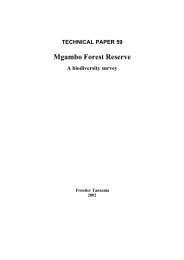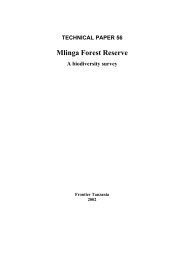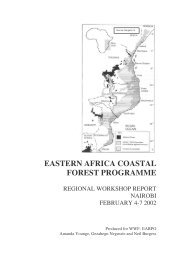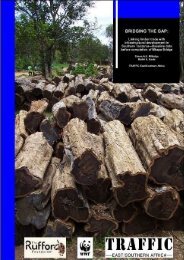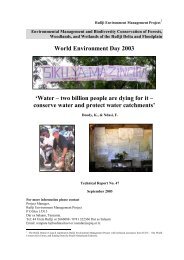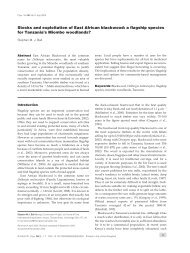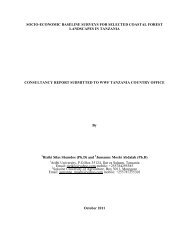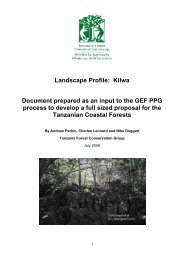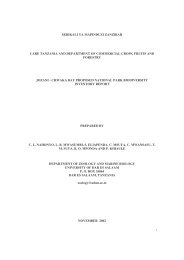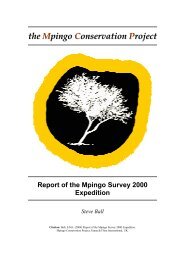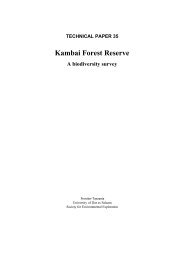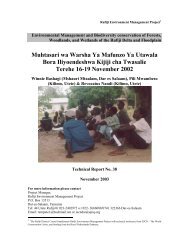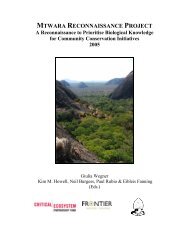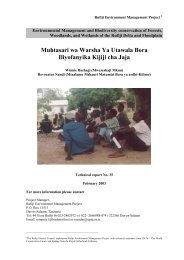A Socio-Economic Profile of the Rufiji Floodplain and Delta.
A Socio-Economic Profile of the Rufiji Floodplain and Delta.
A Socio-Economic Profile of the Rufiji Floodplain and Delta.
Create successful ePaper yourself
Turn your PDF publications into a flip-book with our unique Google optimized e-Paper software.
<strong>Socio</strong>-economic pr<strong>of</strong>ile <strong>of</strong> <strong>Rufiji</strong> flood plain <strong>and</strong> <strong>Delta</strong> - Vol. 1<br />
• Unreliable wea<strong>the</strong>r (including drought <strong>and</strong> flooding). As mentioned earlier (section 2) flood is an<br />
important factor in agriculture in both <strong>the</strong> flood plain <strong>and</strong> <strong>the</strong> <strong>Delta</strong>. Floods are also important in<br />
fishing especially in inl<strong>and</strong> lakes;<br />
• Crop loss due to vermin attack (this has also been emphasised in previous sections <strong>and</strong> in section<br />
2);<br />
• Inadequate capital to invest in agriculture <strong>and</strong> o<strong>the</strong>r economic enterprises (including poor<br />
technology <strong>and</strong> small agricultural plots);<br />
• Inadequate labour force (mainly due to personal risks such as sickness during peak seasons <strong>and</strong><br />
high dependency). The calculation <strong>of</strong> dependency ratio (section 3.1.3) supports this finding. The<br />
calculation shows that <strong>the</strong>re are more people (38.2%) who depend on o<strong>the</strong>rs as far as agricultural<br />
production is concerned;<br />
• Selling crops soon after harvest in order to meet immediate cash dem<strong>and</strong>ing needs, <strong>and</strong>;<br />
• Lack <strong>of</strong> reliable transport <strong>and</strong> market infrastructure contributes to losses in output especially those<br />
<strong>of</strong> perishable goods.<br />
However, respondents are not remaining silent when faced by food shortages. There are a number <strong>of</strong><br />
coping strategies that are undertaken. These include buying food (64.3% <strong>of</strong> respondents), begging<br />
assistance from relatives (14.4% <strong>of</strong> respondents), begging assistance from <strong>the</strong> government (6% <strong>of</strong> <strong>the</strong><br />
respondents) <strong>and</strong> eating alternative foods, (3.9% <strong>of</strong> respondents).<br />
Ano<strong>the</strong>r way <strong>the</strong> households adjust <strong>the</strong>mselves to food shortage is to try out new crops, fishing<br />
methods, alternative use <strong>of</strong> wood products etc.<br />
Table 42: Respondents who tried new crops, fishing methods wood product use by AEZ<br />
Inner <strong>Delta</strong> Inner <strong>Delta</strong> <strong>Delta</strong> <strong>Delta</strong> South North Flood South Flood West Total<br />
North (n=44) South (n=15) North (n=30) Plain Plain (n=13) Valley (n=182)<br />
(n=26<br />
(n=24)<br />
(30)<br />
Percent <strong>of</strong> respondents<br />
Yes 43.2 60.0 30.8 36.7 54.2 30.8 30.0 40.1<br />
No 56.8 40.0 69.2 63.3 45.8 69.2 70.0 59.9<br />
Source: Survey Data (2000)<br />
In this survey, results show that only 40% <strong>of</strong> <strong>the</strong> respondents tried new methods when faced by<br />
production problems (Table 42). Inner <strong>Delta</strong> south <strong>and</strong> north flood plain had relatively many<br />
respondents who tried new methods. It is important to note this when disseminating new technologies<br />
to <strong>the</strong> survey area. Training <strong>and</strong> creating general awareness may be necessary.<br />
When asked about given opportunities to learn something in order to improve <strong>the</strong>ir livelihood, <strong>the</strong><br />
respondents had many areas <strong>of</strong> interest. However, <strong>the</strong> most frequently mentioned areas. in order <strong>of</strong><br />
priority, are training in:<br />
• Modern agricultural skills;<br />
• Business skills;<br />
• Carpentry skills;<br />
• Modern livestock keeping;<br />
• Tailoring, <strong>and</strong>;<br />
• H<strong>and</strong>icrafts.<br />
The responses above show a desire for respondents to improve agricultural <strong>and</strong> livestock skills as well<br />
as training in o<strong>the</strong>r <strong>of</strong>f-farm income generating activities such as business, tailoring <strong>and</strong> h<strong>and</strong>icrafts.<br />
41



